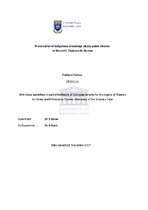| dc.description.abstract | The aim of this research was to investigate the current awareness of indigenous knowledge
(IK) among the youth in the Indian community in Westcliff, Chatsworth, in the Durban area
of KwaZulu-Natal, South Africa. The research sought to establish how IK is viewed by the
youth and librarians, and whether - since IK is predominantly oral - there was a need to
capture, document and preserve it within public libraries.
Martin and Mirraboopa's (2003) framework for indigenist research provided a theoretical
basis for the study and informed its qualitative research design. Two methods of data
collection were used: (i) focus groups with youth of Westcliff, Chatsworth; and (ii) semistructured
interviews with librarians at the local public library.
The study revealed that there is a dire need to preserve IK in Westcliff, Chatsworth. IK was
seen as important knowledge and the librarians and youth who participated recognised
that if IK was not preserved it would be lost to future generations. Librarians interviewed
also saw the need to preserve IK, recognising its importance and holding the view that the
preservation of IK was a function that public libraries should perform but were not
performing.
The study also highlighted the need for community access to IK. The fact that IK is not
currently stored in public libraries meant that there were no formal mechanisms to access
this vital area of knowledge. Digital technology was recognised as a viable means to
capture, document and preserve IK. This emerged from both the focus group discussions
and the semi-structured interviews. IK was seen as an important prerequisite to cultural
continuity in the Westcliff community.
Librarians recognised that they lacked the skills and training to collect, document and
preserve IK in their communities, but indicated that they were willing to learn how to do
this, if appropriate instruction could be provided.
The study made several recommendations for immediate practical steps to be taken,
including the preservation of IK in video or audio formats, for deposit in the community's
public library and curation by librarians; the recording of IK as practised at home through
young people keeping a diary of family rituals, prayers and customs; the preservation of IK
on websites created and maintained by librarians in public libraries; and the necessary and
urgent participation of elders in the community who are the living carriers of IK. | |

